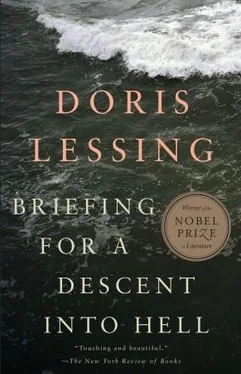After I posted my letter — two letters, actually — I remembered something about Charles that perhaps you should know.
It is about the last war. Of course to me it is rather old hat, but almost from the start of knowing Charles really well I thought that the last war hadn’t done him much good. I once met a friend of Charles (with Charles) who said that Charles once said to him that he — that is, Charles — had decided early in the war that he wouldn’t survive it. He was in danger a lot. His friends, that is, the men he was fighting with, were all killed off around him, twice. He was the only one left alive in a group of buddies, twice. Once in North Africa and once in Italy. When he reached the end of the war he could not believe he was still alive. He had to learn how to believe that he was going to live, said this man. Whose name is Miles Bovey. I’ll put in the address for you because perhaps you should ask him. He said that Charles had a long stretch at the end of the war when he did not want to begin living. He was drinking then. So Miles said but I have never seen Charles drink more than usually. Then Charles went back to University. Charles once said something to me that I have remembered. He said that ever since the war he couldn’t believe that people really found important the things they said they found important. He said he had had to learn to “play little games.” He said Miles Bovey was “the only person who ever really understood me.” I asked him what little games and he said “the whole damned boiling.” Needless to say, I said: Love, too? I don’t remember what he said to that.
Yours sincerely,
CONSTANCE MAYNE
DEAR DOCTOR Y,
Thank you for your kind and explanatory letter. It was not possible to gather very much from Doctor X’s letter.
Yes, I suppose one could say that Charles Watkins was “not himself” that evening, but you must remember my knowledge of him to that date was confined to hearing him lecture, and some remarks about him by mutual friends.
I can’t tell you if that lecture was important to him. It was certainly important to me. I wrote him a long letter telling him it was important and why. Perhaps writing it was a mistake, but looking back I don’t regret it. We sometimes have to take the chance of embarrassing people by claiming more than they want to give — or can. My letter was a claim. Of course I knew it was. You may ask: what did I say in it? but to answer that would mean writing the same letter. Suffice it to say that I heard him lecture, and things he said started me thinking in a new way. Or experiencing in a new way. Of course not in any dramatic exterior way. I did not get an answer to my letter. I thought once or twice of writing again, in case the first letter had not reached him, but there was no reason to suppose it had not. I concluded that my letter had been tactless, or perhaps ill-timed, and that I would not hear at all from him.
But I was sitting that evening in a little Greek restaurant in Gower Street where I go fairly often. Frederick Larson was with me — the archeologist. Suddenly Charles walked in and sat down with us saying: I thought I would find you here.
This was not nearly as odd as it looks. For one thing he knew where I lived, for he had received my letter, and had been to my flat to see if I was in. When he found I was not, he walked about the adjacent streets to see if I was in a pub or a restaurant. As indeed I was.
But his unconventional arrival matched the general oddness of his manner. At first both Frederick and I thought he was drunk. Then, that it might be marijuana, or worse. Then Frederick began pressing him to eat and, clued by this, I realised that his clothes had that peculiarly unconvincingly grubby stale look that grubby clothes get when they are obviously clothes that are usually kept clean. Because he is not the kind of person one would ever expect to wear clothes that have been slept in, this stopped me from seeing at first that everything he wore had a rubbing of grime, and that he had grime marks on his hands. And he had a stale tired smell.
At first he kept refusing food, or rather, seeming not to hear when he was offered it. Then he began eating some rolls on the table, and Frederick simply ordered some food for him, without asking him again, and when it came we could see he was ravenous. He was talking in a disconnected sort of way all the time. I don’t really know what about. It made sense while he talked. He was chatting away as if we were both very old friends and able to pick up all his references to people and places. The thing that made this less extraordinary was that both of us indeed felt we were old friends, for we had talked of him a great deal. He was making references to some voyage he was thinking of making, and even seemed to think we would be with him. Of course by then we had understood he was not at all “himself”—as you put it.
When the meal was over we asked him back to my flat. The three of us walked. It was not more than a couple of hundred yards. In my flat he did not sit down. He was restless and walked about all the time, examining objects very carefully, examining the surfaces of walls, and so on. But I got the impression that he had forgotten or lost interest in the thing he had just examined so carefully by the time he put it down. This went on for two or three hours. He was talking about getting out of the trap, getting out of prison, of escaping — that kind of talk. And it did not seem as odd to us as perhaps you may think it should, because our own thoughts were running on similar lines — or it sounded like that, but I am sure you have often found that one may talk for hours — indeed for days, or a lifetime, with a friend, and then discover that the words you use stand for very different things.
I have no way of knowing how real to Charles that night were the prisons, the nets, the cages, the traps that he talked about. If you can call so disconnected and rambling a stream of words “talking.” But I and Frederick Larson have very definite meanings for such words. But Charles? I can’t say. Once when Charles was out of the room (he suddenly noticed his hands were dirty and went to wash them) we discussed whether or not to call a doctor, but decided not. He did not seem to us unable to look after himself. Perhaps we did wrong — after all, there was the evidence of his grimy clothes, and his obvious need for food, and the general strain and exhaustion. But I am one who does not believe that other people’s crises should be cut short, or blanked out with drugs, or forced sleep, or a pretence that there is no crisis, or that if there is a crisis, it should be concealed or masked or made light of. I am sure that other people, and they would be those that a doctor might consider responsible, would have arranged for a doctor to come and take Charles into custody — forgive me for putting it like that. But his state of mind — as far as I could judge it — seemed not unlike my own at times in my life which I have found most illuminating and valuable.
And then, too, I wanted to go on listening to him.
While his remarks may have been scattered, there was an inner logic to them, a thread, which sounded at first like a repetition of certain words or ideas. Sometimes it seemed as if the sound, and not the meaning of a word or syllable in a sentence, gave birth to the next sentence or word. When this happened it gave the impression of superficiality, of being “scatty” or demented. But we have perhaps to begin to think of the relation of the sound of a word with its meaning. Of course poets do this, all the time. Do doctors? Sounds, the function of sounds in speech … we have no way yet of knowing — have we? — how a verbal current may match an inner reality, sounds expressing a condition? But perhaps this sort of thought is not found useful by you.
Читать дальше
Конец ознакомительного отрывка
Купить книгу










